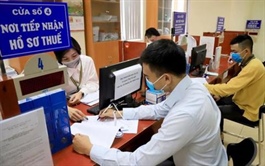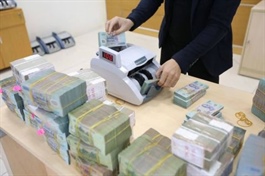SMEs must be afforded finance access
SMEs must be afforded finance access
Smaller enterprises in Vietnam, despite contributing up to 70 per cent to GDP, still face significant challenges in accessing finance.

Nguyen Minh Tu, managing director of FiinGroup’s Corporate Information Division, underscored the critical role that small- and medium-sized enterprises (SMEs) play in Vietnam’s economy at last week’s seminar on SME financing.
“SMEs currently account for more than 90 per cent of all businesses in Vietnam, generating approximately one-fifth of the total revenue of Vietnamese enterprises,” he said. “Nearly half of them are engaged in wholesale and retail activities, acting as crucial intermediaries between manufacturers, agents, and consumers.”
Tu noted that the financial gap for SMEs in Vietnam is estimated to be around $24 billion, which is 2.11 times the current lending level for SMEs. In comparison, the financial gap for SMEs in other developing countries is only 1.23 times the current lending levels.
“This disparity highlights the unique challenges faced by Vietnamese SMEs. Addressing this gap requires not only innovative financial products but also concerted efforts from policymakers and financial institutions to create an enabling environment for growth,” Tu added.
Pham Thi Thanh Huyen, programme manager for Financial Infrastructure Development in Vietnam and Cambodia at the International Finance Corporation (IFC), revealed that the current loan value for SMEs and micro-businesses in Vietnam stands at over $11.2 billion, meeting only one-third of the credit demand.
“This leaves a significant financial gap of approximately $24 billion, with the unmet credit needs for micro-enterprises at $1.9 billion and for SMEs at $21.7 billion,” Huyen explained. “The large financial gap underscores the pressing need for improved financial infrastructure and targeted financial products to support the growth and development of SMEs in Vietnam.”
Huyen pointed out that both internal and external factors contribute to the difficulties SMEs face in accessing credit. Internally, SMEs often lack transparency in financial and governance information and fail to meet financial standards and industry practices.
“Externally, the Vietnamese financial market lacks banking products and financial services tailored for SMEs, with a lending culture that heavily relies on real estate collateral while neglecting movable assets such as receivables, inventory, and commercial documents,” Huyen said.
She also stressed the importance of securitising receivables to accelerate the capital turnover process for banks. “Collaboration between the Ministry of Finance and the State Bank of Vietnam to develop and sign agreements on securitising receivables could significantly boost the liquidity of banking assets,” she noted.
According to Huyen, the IFC has been instrumental in shifting lending practices in Vietnam from collateral-based lending to more flexible asset-based lending.
“In 2005, over 90 per cent of loans were secured by real estate. Today, more than 30 per cent of loans are secured by movable assets, thanks to the IFC’s efforts,” she explained.
Meanwhile, Nguyen Van Nam, deputy director of Corporate Information at FiinGroup, emphasised that traditional credit-scoring methods present significant obstacles for SMEs in accessing loans from financial institutions.
“There are several key challenges that SMEs will face. These include a lack of transparency in information, stricter lending standards from financial institutions, difficulties in providing collateral, and issues related to credit scoring and risk management capabilities, as well as data, products, and credit processes,” Nam said.
In the future, SMEs will continue to struggle with financial access due to these stringent requirements. “The current capacity for credit scoring, risk management, and data collection is inadequate, making financial institutions hesitant to disburse loans without real estate collateral,” Nam added.
However, he also pointed out that there are promising opportunities for such businesses. “They can benefit from the law on supporting SMEs, green credit support, and sustainable development initiatives,” he stated. “These frameworks offer a brighter outlook for them, allowing financial institutions to optimise their loan portfolios based on enhanced risk analysis capabilities. This, in turn, will improve access to credit, particularly for younger businesses.”
Data analysis from the State Bank of Vietnam and financial reports from non-bank financial institutions and Vietnamese banks by FiinGroup shows that the total credit balance for SMEs among non-bank financial companies reached approximately $3 billion, while banks recorded nearly $110 billion in 2023. However, non-bank financial institutions have demonstrated strong growth in recent years, with a growth rate of 26.8 per cent last year.
Experts recommend that financial institutions optimise their loan portfolios based on advanced risk analysis capabilities to enhance access for SMEs, particularly younger businesses. As of June, FiinGroup’s data and risk assessment models identified nearly 31,800 SMEs that have not accessed loans despite having low or very low risk levels.




























